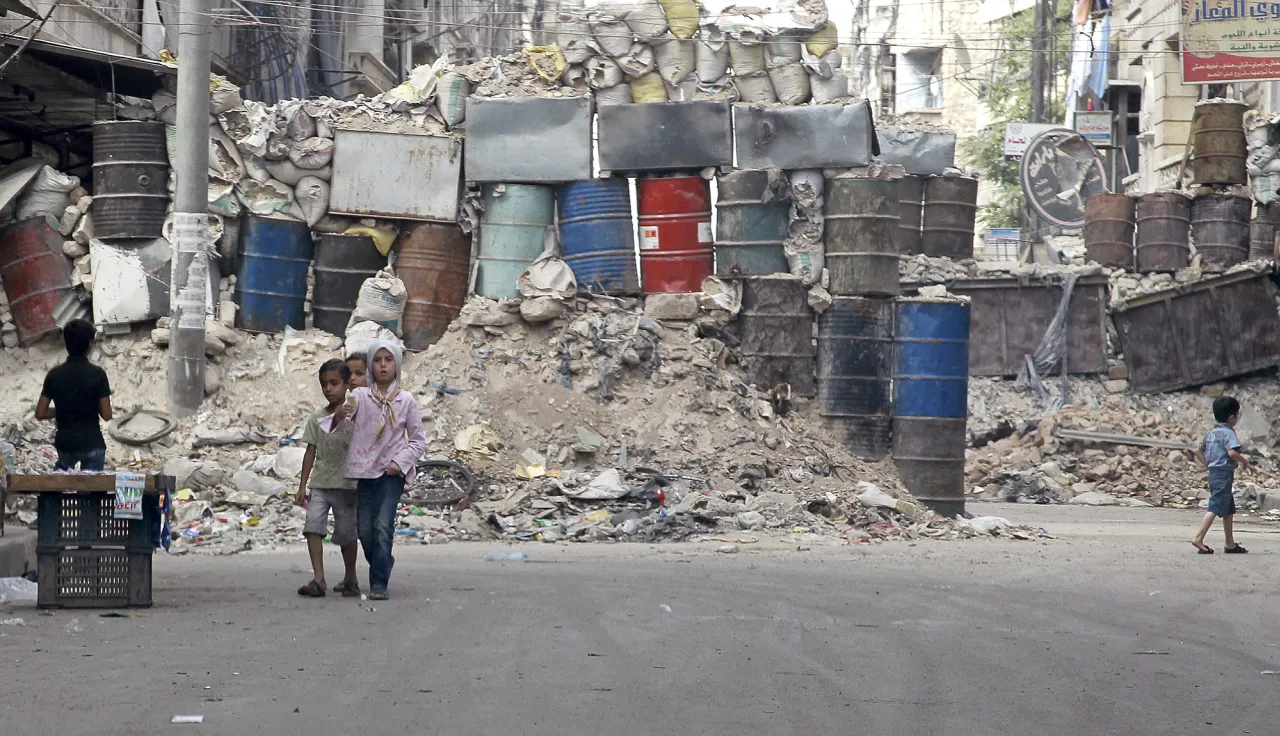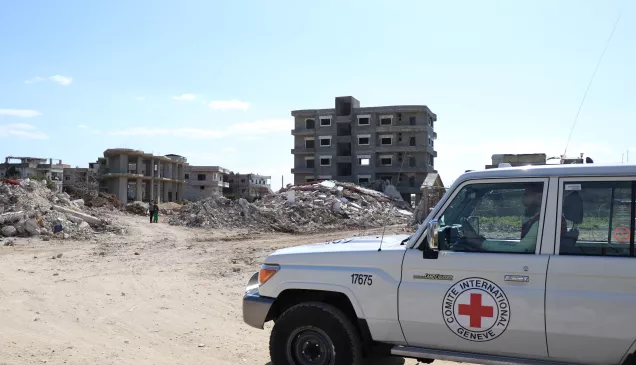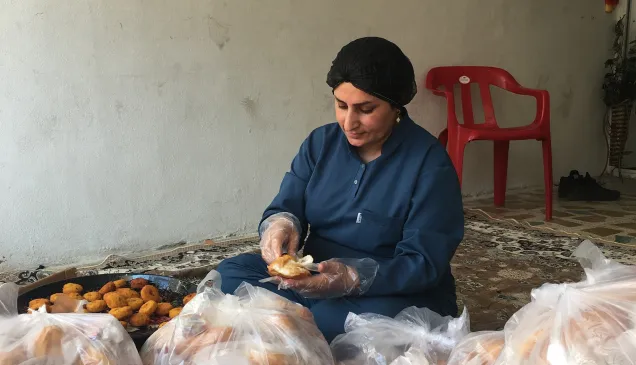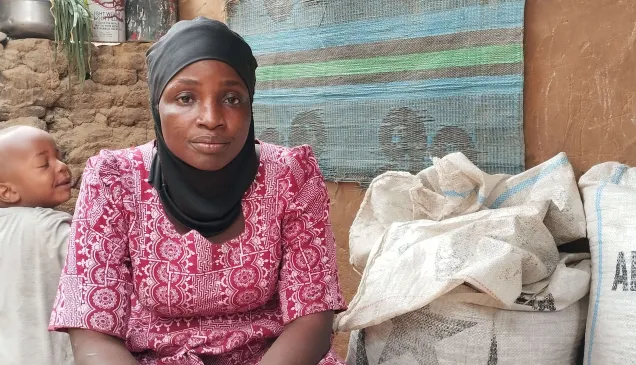Syria: Food aid reaching more people

In August, the ICRC and its Syrian Arab Red Crescent partner provided food aid for 530,000 people across 10 Syrian governorates, including 90,000 people living in opposition-controlled areas – the largest amount they had provided in a single month since the beginning of the armed conflict in 2011.
Since January, the ICRC has been working closely with the Syrian Arab Red Crescent to increase its emergency food aid across Syria, delivering on average 440,000 individual food rations every month. In the first eight months of the year, food reached over 3.5 million people – the same number as in all of 2013.
The ICRC and the Syrian Arab Red Crescent distribute food to conflict-affected people on the sole basis of need, regardless of their political, ethnic or religious affiliations, with distributions regularly taking place across front lines with the approval of all parties.
The Syrian Arab Red Crescent maintains an extensive presence and network in cities, towns, and villages across Syria, including in opposition-held areas. It is therefore particularly well placed to credibly assess the needs of the people suffering the effects of the conflict. ICRC and Syrian Arab Red Crescent food distribution plans are shared with other humanitarian organizations working in the country to ensure that aid activities are as coordinated and effective as possible.
The ICRC relies on its logistical hubs in Damascus and Tartus to deliver food to Syrian Arab Red Crescent branches in the field. Red Crescent volunteers and local committees rapidly distribute parcels containing rice, salt, oil, tea, and a range of canned food items to families and communities in need.
Facts and Figures – August 2014
The ICRC is currently working in Damascus, Aleppo and Tartus. Over 270 staff endeavour to distribute food, restore water supplies, improve health-care services and re-establish contact between people separated by the conflict.
Emergency aid
In August, the ICRC supplied food to 530,000 people in 10 governorates: Damascus, Rural Damascus, Quneitra, Sweida, Dara'a, Homs, Hama, Tartus, Lattakia and Aleppo.
Nearly 34,000 people living in shelters in Damascus, Homs, Lattakia and Rural Damascus received daily hot meals through collective kitchens supported by the Syrian Arab Red Crescent and supplied by the ICRC.
Additionally, over 148,000 people displaced by fighting received essential household items such as hygiene kits, blankets, mattresses, towels, water buckets, rechargeable flashlights, candles and cooking sets.
Water and sanitation
The ICRC worked closely with the Syrian Arab Red Crescent and local water boards across the country to provide
- ten 5,000-litre water tanks at Newroz camp, 60 kilometres west of Qamishli, Hassakeh governorate, providing clean water to Iraqi refugees from fighting in the Sinjar region;
- repairs for 11 water pumps in Qamishli providing water for over 120,000 people;
- a 100 kilovolt-ampere electric generator that helps to pump water used by over 80,000 Qamishli residents;
- sanitation and water network upgrades for Al Dweir shelter, in Rural Damascus, which is home to over 1,600 Adra residents displaced by the fighting. The ICRC also pays for a water truck that makes weekly deliveries to Al Dweir;
- repairs for pumping equipment at College City, Kesweh, Marouneh, and Al Nabek water stations, which together provide clean water for over 300,000 Rural Damascus residents;
- a 5000-litre water tank and other essential equipment for the Tal Kurdi and Al Nabek shelter camps, which are currently disconnected from Rural Damascus’ water network;
- water trucking for over 82,000 displaced people currently living in Jdeidet Al Fadel and Aartouz Al Dahra, in Rural Damascus;
- maintenance and repairs for 15 water pumps located across Quneitra governorate, to help provide clean water for over 300,000 people;
- various kinds of equipment and water disinfectant for wells in Qourtoba, Burj Al Eshara, the Palestinian Club, and Nakaabet Al Mohameen, in Aleppo governorate. The ICRC provided these supplies proactively, in case the water supply is cut off by fighting;
- regular maintenance and emergency repairs for the Aleppo city water network;
- a 5000-litre water tank for the Japanese Center, an Aleppo shelter that houses over 700 people who fled the fighting;
- sanitation and water network upgrades for Dar Al Aytaam shelter, in Idlib governorate, which houses over 800 displaced people;
- water trucking for Homs shelters housing over 21,000 people;
- sanitation and water network upgrades for AbdulKarim Rajab, Al Barnawi Clinic, and Maamal Al Qitaraat, in Hama governorate, which together host 600 people;
- financial support and maintenance for a Syrian Arab Red Crescent water trucking service in Deir Ezzor, which provides drinking water for over 15,000 people living in shelters across the city.
Health
The ICRC worked closely with the Syrian Arab Red Crescent to provide:
- supplies and financial support for nine Syrian Arab Red Crescent mobile health clinics and one outpatient care facility in Hama, which together have the capacity to provide health services for over 7,000 people every month.
Protection
- The ICRC organized a phone call between a detainee in Papua New Guinea and his family in Dara'a.
- The ICRC delegation in Damascus received 147 tracing requests from people seeking to locate their relatives.
- The ICRC arranged for 33 students to return to their villages in the occupied Golan to spend the summer holidays.
- The ICRC distributed one Red Cross message (containing family news only) and eight salamats (oral messages to family members), mainly from Syrians living abroad.
For further information, please contact:
Simon Schorno, ICRC Damascus, tel: +963 993700847 (English/French)
Umar Phiri, ICRC Damascus, tel: +963991186694 (Arabic/English)
Sitara Jabeen, ICRC Geneva, tel: +41 22 730 24 78 or +41 79 536 92 31



